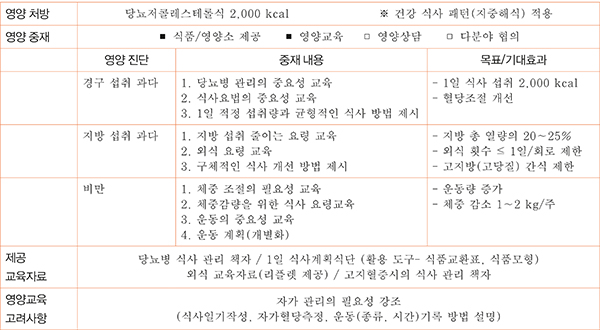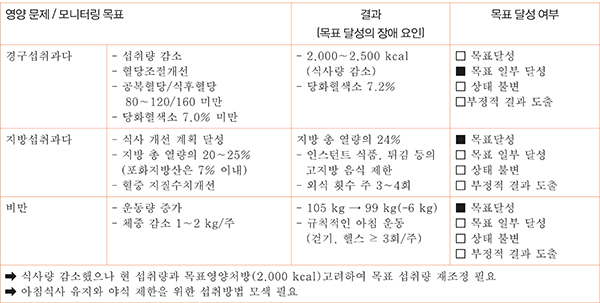Abstract
From the early stage of diabetes diagnosis, it may necessary to modify lifestyle including nutrition and physical activity. Self-management instruction and support can result in healthy eating habits for effective blood sugar management. Clinical nutritionists must conduct accurate nutritional assessments for successful dietary change and patient health. They must also diagnose and prioritize the nutritional problems to be addressed. Through medical nutrition therapy, nutritionists must instruct and encourage patient self-management skills based on evidence-based nutritional guidelines and education about viable strategies. For this purpose, educators should strive continuously to acquire knowledge and professional training.
References
1. Korean Diabetes Association. 2019 treatment guideline for diabetes. 6th ed. Seoul: SeoulMedcus;2019. p. 57–64.
2. American Association of Clinical Endocrinologists American College of Endocrinology. AACE/ACE comprehensive type 2 diabetes management algorithm. 2019 Jul 4. Available from: https://www.aace.com/pdfs/diabetes/AACE_2019_Diabetes_Algorithm_FINAL_ES.pdf.
3. Korean Diabetes Association. Treatment guideline for diabetes. 5th ed. Seoul: Gold Planning and Development;2015. p. 90–92.
4. American Diabetes Association. Lifestyle management: standards of medical care in diabetes-2019. Diabetes Care. 2019; 42(Suppl 1):S46–S60.
5. Powers MA, Bardsley J, Cypress M, Duker P, Funnell MM, Fischl AH, Maryniuk MD, Siminerio L, Vivian E. Diabetes self-management education and support in type 2 diabetes: a joint position statement of the American Diabetes Association, the American Association of Diabetes Educators, and the Academy of Nutrition and Dietetics. J Acad Nutr Diet. 2015; 115:1323–1334.

6. Chrvala CA, Sherr D, Lipman RD. Diabetes selfmanagement education for adults with type 2 diabetes mellitus: a systematic review of the effect on glycemic control. Patient Educ Couns. 2016; 99:926–943.

7. Møller G, Andersen HK, Snorgaard O. A systematic review and meta-analysis of nutrition therapy compared with dietary advice in patients with type 2 diabetes. Am J Clin Nutr. 2017; 106:1394–1400.

8. Korean Society for the Study of Obesity. Treatment guideline for obesity 2018. Seoul: Cheongun;2018.
9. Canadian Diabetes Association Clinical Practice Guidelines Expert Committee. Clinical Practice Guidelines Nutrition Therapy. Can J Diabetes. 2013; 37:S45–S55.
10. Ley SH, Hamdy O, Mohan V, Hu FB. Prevention and management of type 2 diabetes: dietary components and nutritional strategies. Lancet. 2014; 383:1999–2007.

11. American Diabetes Association. Life with Diabetes - a series of teaching outlines(5th). Michigan Diabetes Research and Training Center:Martha Funnell;2014. p. 359–368.




 PDF
PDF ePub
ePub Citation
Citation Print
Print










 XML Download
XML Download